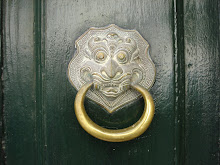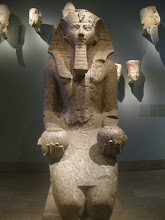It was a nice, sunny day and Tarek and I got in the car in the morning after a breakfast of foul and hummus with his mom and dad (don't tell them, because officially we went to Bethlehem to visit some friends... Jenin isn't considered to be one of the safer areas in Palestine).
We drove through olive tree valleys and cypress dotted hills, past two groups of Israeli settlers escorted by Israeli military and intelligence--I don't know, scouting out the landscape or whatever. We swished past checkpoints (anybody stupid enough to go north isn't worth checking), passed through Nablus, and went all the way to Berqin.
Palestine is beautiful.
In Berqin, a small village in the Jenin area, we pull up in front of Nasser Abufarha's new olive oil pressing facility for Canaan Fair Trade. I've written about Canaan before--the company that exports Fair Trade and organic olive oil from the ancient land of Palestine. The new facility looks great--the showroom is fantastic.

Mahmoud is there. Mohamed is there. Ahmed is there, with his little baby boy. Nasser is there, of course, but is too busy with all the foreign tourists that has come to get a tour of the olive presses. A bunch of farmers and farmers' wives I recognize from last summer when I interned there are there.
And Abir is there. With two of her sisters.
She kisses me, says welcome back and goes, "Remember her name?" in Arabic and points at one of her sisters.
I realize I don't actually remember her name, and ashamedly admit that I don't.
And that's when I get slapped. Or smacked, actually. Before I can even comprehend what Abir is doing, she smacks me right in the face for having forgotten her sister's name. Not a cute friendly slap, but a real, hard smack right in the face.
True to my spineless nature, I don't do anything but hide my shock and act as if everything is very normal. Abir and I keep talking. She finds out I've been in Palestine for three weeks, and goes:
"You've been back for three weeks and you didn't come to Faqo'a?!" and smacks me in the face again.
I say I'm sorry.
Is this what they call tough love?
Foreigners, mostly women in odd hippie clothes, sit under olive trees and around fires and drink sweet tea that farmers made for them.
Under one tree, a few men are conducting their afternoon prayers. Another man talks on his cell phone.

It's nice to see people again, but I feel a little disconnected. Not sure if it's me, or if it's because I live in Ramallah now, and I brought my boyfriend and I won't stay the night and I don't accept invitations to come to Faqo'a after the harvest event, and they all think I changed or got stuck up or something. Not sure.
Tarek isn't very excited about being in Jenin at all, being the city boy he is, and wants to leave before it gets dark. After all, we have more than two hours to drive. Way more than two hours, because on the way south again, we get stuck in checkpoint traffic at every single checkpoint.
Palestine is beautiful, but sometimes it requires quite a lot of patience to experience it.



















